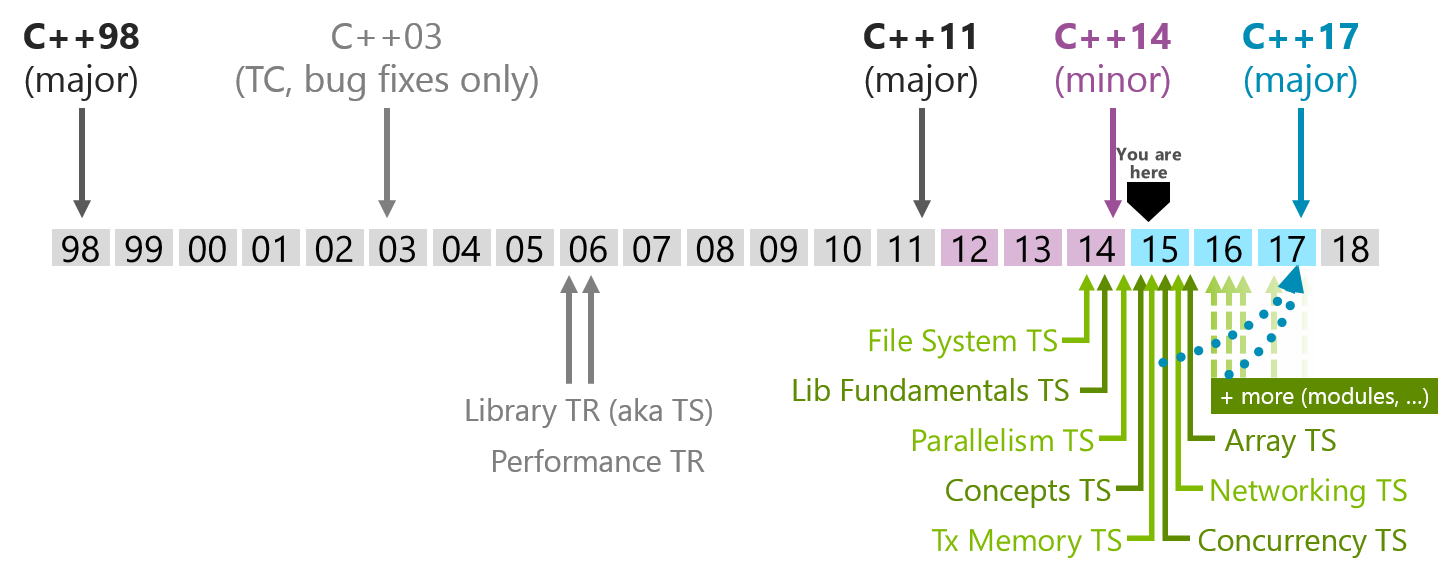Preparation
In this tutorial, we will transform a short program from legacy C++ into C++11, and learn a few of the new features along the way.
The tutorial is designed for you to follow along hands-on: We will alternate between meeting a feature and integrating it into our code. If you want to get your hands dirty, the presentation slides and code samples are available on
git clone https://github.com/nikolausmayer/cpp11presentation
(please use GCC/g++ ≥ 4.7) but you are not required to do so.
Disclaimer
I am not an expert in C++(11). I may or may not be able to answer technical questions.
The code examples are designed to highlight specific language features, and may not always represent best code practices or sensible program design.
If you are using Boost, you may already know much of what follows.
C++11
A superficial, cherry-picking hands-on introduction not as scary as it sounds
Nikolaus Mayer
Overview
- What is C++11?
-
auto - Range
forloops - Smart pointers
- Uniform initialization syntax
- λ
- Multiple return values
- Miscellaneous
What is C++11 ...
- C++11 is a C++ standard specification published in 2011
- It replaces C++03 and is itself replaced by C++14 / C++17
- C++11 adds to the core language and the Standard Library

What is C++11 ...
- C++11 is a C++ standard specification published in 2011
- It replaces C++03 and is itself replaced by C++14 / C++17
- C++11 adds to the core language and the Standard Library
... how do I use it ...
- Use GCC 4.7 or later for best results (or Clang)
- Compile with
-std=c++11(-std=c++0xfor GCC ≤ 4.6)
... and why should I?
- We'll get to that
- You don't lose anything (few exotic breaking changes*)
*) http://stackoverflow.com/a/6402166
Hands-On
- Make sure you have at least g++-4.7, and if not:
sudo apt-get install g++-4.9 gcc-4.9 - If you didn't do it earlier, get the materials:
git clone https://github.com/nikolausmayer/cpp11presentation - In your favourite editor, open the Makefile in the repository’s code folder
code/Makefile - Add
-std=c++11toCXXFLAGS -
maketo make sure it works. If you had to install a new g++, you might want to useCXX=g++-4.9 make
The elephant in the room: auto
- The
autokeyword is not new, but its meaning has changed - Before: Storage class specifier (cf.
static,extern) - Now: Automatic type deduction:
float almostpi = 3.14f; std::vector<SomeClass<SomeType> >::iterator it = myvec.begin();can becomeauto almostpi = 3.14f; auto it = myvec.begin(); - Type deduction happens at compile time
- Important: In general,
autoignores references andconst/volatile(there are special cases)
Return type deduction: auto, decltype
template <typename T1, typename T2>
auto add(T1 t1, T2 t2) {
return t1 + t2;
}
auto v = add(2, 3.14);
template <typename T1, typename T2>
auto add(T1 t1, T2 t2) -> decltype(t1 + t2) {
return t1 + t2;
}
auto v = add(2, 3.14);
“Trailing” return type?
decltype can do anything that auto can. Why not write...
template <typename T1, typename T2>
decltype(t1 + t2) add(T1 t1, T2 t2) { // (a)
return t1 + t2;
}
decltype(add(2, 3.14)) v = add(2, 3.14); // (b)
- (a)
t1andt2are technically unknown at that point - (b) This is just cumbersome
-std=c++1y in GCC 4.8, -std=c++14 in GCC≥4.9):
template <typename T1, typename T2>
auto add(T1 t1, T2 t2) {
return t1 + t2;
}
With great power
comes great responsibility
int i = 5;
ProbabilityModel obj = m[i];
std::pair<int,int> p = m_hocos[0];
std::cout << obj.prob(p);
|
|
auto is a double-edged sword. If you let it loose, it will destroy your code. Use it wisely, and keep in mind: Either declaration or handle must be informative.
Range-for loops
auto point = m_homogeneous_coords[0];
std::cout << model.prob(point);
std::vector
for (unsigned int i = 0; i < m_homogeneous_coords.size(); ++i)
std::cout << model.prob(m_homogeneous_coords[i]);
i. The “good” solution (which also works for e.g. std::map) is far worse still:
for (std::vector<std::pair<int,int> >::iterator it = m_...begin();
it != m_homogeneous_coords.end();
++it)
std::cout << model.prob(*it);
Range-for loops (cont.)
for point in m_homogeneous_coords:
print(point)
for (auto point: m_homogeneous_coords)
std::cout << model.prob(point);
for (const auto& point: m_homogeneous_coords)
std::cout << model.prob(point);
auto way does not work.
Boost incarnate: Smart pointers
std::vector<myClass*> vec;
myClass* instance = new myClass(...);
vec.push_back(instance);
<memory> header and write
std::vector<std::unique_ptr<myClass> > vec;
vec.push_back(std::unique_ptr<myClass>(new myClass(...));
vec is destroyed, all of its elements are automatically and safely destroyed as well.
Boost incarnate: Smart pointers (con.)
unique_ptr is useful if an instance is never shared and never copied. To get the full functionality of naked pointers (e.g. copyability), use shared_ptr instead.
std::vector<std::shared_ptr<myClass> > vec;
std::shared_ptr<myClass> myClass_ptr{0};
myClass_ptr = std::make_shared<myClass>(...);
vec.push_back(myClass_ptr);
* and ->, as well as checked for not-null using
if (myClass_ptr) {...}
unique_ptr has virtually no overhead; a shared_ptr has some due to e.g. reference counting (weak_ptr can help).
Uniform initialization syntax
std::shared_ptr<myClass> myClass_ptr{0};
std::shared_ptr<myClass> myClass_ptr = 0;
std::shared_ptr<myClass> myClass_ptr = {0};
In C++11 the first version is correct and preferred. It is an example of the new uniform initialization syntax.
Pop quiz
class myClass;
void Func() {
int foo(myClass());
}
foo?
- An
intvariable - A prototype for a function that takes a
myClassand returns anint - A prototype for a function that takes a function that returns a
myClass, and returns anint - Undefined behaviour

Uniform initialization syntax (cont.)
class myClass;
void Func() {
int foo{myClass{}};
}
foo can only be a variable of type int. This is almost universally preferrable to legacy style. The only real restriction is that narrowing is no longer allowed:
int a(5.2); // ok, a==5
int a{5.2}; // error!
Lambda
int main() {
std::vector<float> numbers;
...
auto multiplier = [&numbers](float factor) -> void {
for (auto& elem: numbers) elem *= factor;
};
multiplier(3.0f);
}
multiplier is a function. It
- captures the variable
numbersby reference, - takes a
floatargumentfactor, - returns
void(remember trailing return?), - and multiplies each element in
numbersbyfactor.
auto is necessary because the type of a lambda function is complicated and inferred at compile time.
Lambda (cont.)
[](){}();
void function which takes no parameters and does nothing. It is also completely legal.
Multiple return values
def argmin(sequence):
min_index = ...
min_value = ...
return [min_index, min_value]
mini, minv = argmin(v)
|
|
Multiple return values (cont.)
template <typename T>
std::tuple<int, T> argmin(std::vector<T>& v)
{
int min_index = {...}
T min_value = {...}
return std::make_tuple(min_index, min_value);
}
...
int mini;
float minv;
std::tie(mini, minv) = argmin(numbers);
std::tuple can take arbitrarily many elements and types. If you do not care about some of the return values...
std::tie(mini, std::ignore) = argmin(numbers);
Checking for C++11
#if __cplusplus > 199711L
std::cout << "Compiled using C++11 or later\n";
#else
std::cout << "Compiled using C++03 or earlier\n";
#endif
__cplusplus are 199711L (C++98/C++03 aka "C++"), 201103L (C++11) and 201402L (C++14).
#ifdef HAS_MOVE_SEMANTICS
Pop Quiz
std::vector<std::vector<int>> vec;
error: '>>' should be '> >' within a nested template argument list
std::vector<std::vector<int> > vec;

Compile-time assertions
int stupid_division(int a, int b) {
assert(b != 0);
return (a / b);
}
template <int N>
class Filter {
...
}
Filter is only valid for N>1?
Compile-time assertions (cont.)
template <int N>
class Filter {
Filter() {
if (N<=1) throw std::runtime_error("Filter invalid for N<=1");
}
...
}
template <int N>
class Filter {
Filter() {
static_assert(N>1, "Filter invalid for N<1");
}
...
}
and their trusty sidekicks, type traits
template <typename T>
T very_small_value() {
return (T)0.00001;
}
T is an integer type?
template <typename T>
T very_small_value() {
throw std::runtime_error("Bad type");
return (T)0.00001;
}
template float very_small_value<float>() { return 0.00001f; }
template double very_small_value<double>() { return 0.00001; }
...
and their trusty sidekicks, type traits
template <typename T>
T very_small_value() {
return (T)0.00001;
}
T is an integer type?
Solution 2: Type trait check for floating-point-ness
template <typename T>
T very_small_value() {
static_assert(std::is_floating_point<T>::value,
"very_small_value only works for float types");
return (T)0.00001;
}
type_traits header:is_enum, is_const, is_move_assignable...
Speaking of enum...
enums have underlying types
Standard C++ 7.2/5:
The underlying type of an enumeration is an integral type
that can represent all the enumerator values defined in the
enumeration.
enum boyfriend_type { rich, nice, cool };
enum CERN_magnet_status { warm, cool, supercool };
error: redeclaration of ‘cool’
note: previous declaration ‘boyfriend_type cool’
Speaking of enum... (cont.)
enum class boyfriend_type { rich, nice, cool };
enum struct CERN_magnet_status { warm, cool, supercool };
...
int magnet = CERN_magnet_status::supercool; // not ok
CERN_magnet_status magnet = CERN_magnet_status::supercool; // ok
enum class boyfriend_type : short { rich, nice, cool };
enum CERN_magnet_status : int { warm, cool, supercool };
Hashable types
type_values = {int: 1, float: 2}
std::map<std::typeinfo, int> type_values;
type_values[typeid(int)] = 1;
template <typename T>
struct type_values { static const int value = 0; }
template struct type_values<int> { static const int value = 1; }
Hashable types (cont.)
std::map<std::typeinfo, int> type_values;
type_values[typeid(int)] = 1;
type_index:
std::map<std::type_index, int> type_values;
type_values[std::type_index(typeid(int))] = 1;
Matlab® vs C++11
-
no type declarations
➞
auto - automatic memory management ➞ smart pointers
- not free ➞ free
- interpreted ➞ not interpreted
- call-by-value ➞ (smart) pointers, references
Many more things
decltype,
initializer lists,
constexpr,
Constructors calling other constructors of the same class,
override and final keywords,
rvalue references,
[[noreturn]] and other attributes,
Variadic templates,
std::nullptr_t,
type traits,
std::thread,
std::promise,
std::future,
std::packaged_task,
static_assert,
std::chrono::steady_clock,
class enum,
std::I_hope_this_is_too_small_to_read, ...
C++14 offers even more, but compiler support may be incomplete (Clang is leading). C++17 is not yet finalized. YouTube offers many great CppCon talks on this topic.
Summary
- C++11 takes away much of the C++ grind
- There is no hard reason not to use it
- On a remotely up-to-date system, it’s just a keyword away
- But please, think before you
auto
THE END
Thank you for you attention!
Questions?
Sources
- stackoverflow.com, cppreference.com, en.wikipedia.org
- https://www.ibm.com/developerworks/community/blogs/5894415f-be62-4bc0-81c5-3956e82276f3/entry/introduction_to_the_c_11_feature_trailing_return_types
- http://www.codeproject.com/Articles/570638/Ten-Cplusplus-Features-Every-Cplusplus-Developer
- http://thbecker.net/articles/auto_and_decltype/section_01.html
Images:
- C++ timeline: isocpp.com
- jesuschristhowhorrifying: horribleville.com
- areyoufuckingkiddingme: knowyourmeme.com